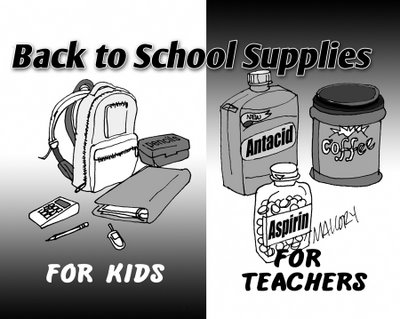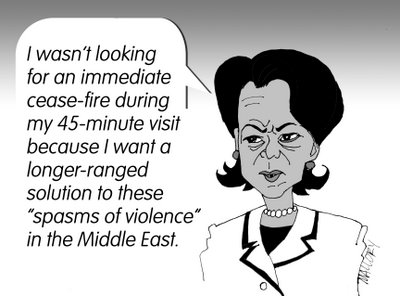
Meeting the needs of a community
Page 3 Charter Oak-Ute NEWSpaper & Schleswig Leader- Thursday, August 31, 2006
We hear a lot of crusty veteran teachers complain that the profession just isn’t what it used to be. Often they point out that it’s the kids. Kids just don’t respect their teachers like they used to or learning just isn’t as important to these kids anymore.
To some degree that’s true. Society has certainly evolved over the years so that what we used to call its basic fabric seems to be worn thin. Divorce is twice as prevalent as it was fifty years ago. Television, games and the rest of the media have desensitized youth to sex and violence to the point where both are taken for granted. The world itself and its economy seem to have forever altered what used to be thought of as “the American Dream.”
High School teachers are especially frustrated when their students don’t seem to be prepared enough for them to learn the subjects in their class. High pressure from new un-funded laws make things more complicated, as do special needs students being added to the mix of already over sized and under equipped classrooms.
Elementary teachers are frustrated because they feel like they have to become all things to all their students. It’s not enough that they need to teach their subject matters, but they need to teach manners, civility, conflict-resolution, drug prevention, abstinence or sexual responsibility and a host of other responsibilities that fifty years ago were the responsibility of the nuclear family, extended family, or church and civic organizations to address.
But maybe instead of wishing for the good old days, we all need to recognize the society we live in today and start addressing the needs of our kids here and now.
For some of us, teachers and communities alike, this may require major adjustments to our thinking and how we do things.
I’d bet that more than half of all kids don’t have what used to be traditional “nuclear family” situations anymore. How then, could we begin to imagine, let alone expect that they’d have “family values?”
For many kids, their “values” are down right primal. An over-simplified explanation might look like this: If you’re “family” makes more than $250,000 per year, you probably value influence and status. Between say $40,000 and $250,000 and you’re probably valuing things, conveniences, clothes, gadgets, vehicles, etc. Your stuff. Under $40,000 and you’re going to value things like your next meal, your security, your safety, and people who accept you and are loyal to you.
Abraham Maslow was a psychologist that almost every teacher is taught about. He had a theory that every human being has some very basic needs. I think that it’s time that all of us, not just teachers, considered the needs of our children.
Maslow was the first of seven children born to his parents, who were uneducated immigrants. He ended up being the chairman of the psychology department at Brandeis University throughout the 1950’s and 60’s.
Abraham Maslow broke down people’s needs into two categories, “deficiency needs” and “growth needs.” If the deficiency needs aren’t being met, the person is in survival mode. Once the deficiency needs are met, then we can start to address the growth needs.
Here are Maslow’s first four, or “deficiency” needs:
1) Physical: hunger, thirst, bodily comforts, etc.
A kid can’t learn if they’re malnourished. Their brains and bodies literally aren’t able to, besides that it’s hard to concentrate.
2) Safety/security: being out of danger.
How can you learn and behave well, when you don’t have a place to sleep, or you’re constantly threatened? For many kids, school is the least volatile place they spend time at. Alcohol, inappropriate sexuality, illegal drugs including meth, and physical violence are all routine parts of many children’s lives.
3) Belonging and Love: being accepted or part of something.
4) “Esteem:” to achieve and become competent, gaining approval and recognition.
It does seem unreasonable to expect classroom teachers to have to fulfill all of these needs for all of their students before they ever begin to address “growth needs” like thinking and learning skills, and aesthetic judgements, let alone academic subject area content like math and reading.
But the needs remain. Schools and communities need to adjust and adapt in order to be able to address these needs. Whether because of ignorance, circumstance, poverty, or impatience, fewer and fewer parents seem to be managing to.
Boyer Valley School District has added a day care, and a family-community coordinator. Our library is shared with the city and soon we’ll have a community based fitness center on our campus. The Area Education Association helps provide psychological and social services.
Many school buildings host things like recovery group meetings or community college classes in the evenings. I wouldn’t doubt that the Denison Schools offer adult education classes or at least English as a second language classes on their campus.
We as communities, church congregations, and civic organizations need to open our eye, our hearts, and perhaps our schedules or at least pocket-books to the needs of the children who live around us.
School districts, boards, administrators, and teachers need to open our minds to new ways of approaching these needs. That may include collaborating with cities or businesses, or with other districts. It will certainly take patience and compassion.
All of us need to consider ways that we can help provide for these most basic needs of our neighbors. If we don’t we’ll all pay a heavy price.
___________________________________________________________Ted Mallory is a resident of Charter Oak and a teacher and coach at Boyer Valley Schools in Dunlap. He has taught History, Art, Journalism, and Religion over the last 13 years at Trinity Lutheran Middle School in Reseda, CA, Los Angeles Lutheran Jr/Sr High School in Sylmar, Ca and now at Boyer Valley MS/HS.



























